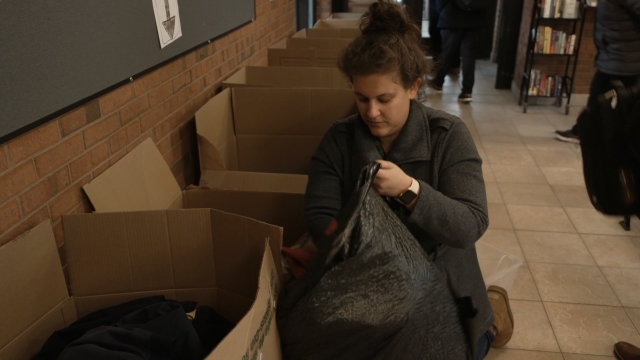The early morning rush hour in Wilmette, Illinois, was typical. But as commuters entered the train station in this wealthy Chicago suburb, they may have noticed it looked somewhat different. Cardboard boxes full of donated clothing lined the walls, and a handful of volunteers were busy sorting through it all and storing the surplus in a nearby trailer.
"We've gotten honestly so much, which has been amazing," said local resident Jessica Leving Siegel.
She has been leading the donation projecting since mid-January, shortly after buses from Texas started dumping migrants at the Wilmette station with tickets for downtown Chicago.
The buses arrive unannounced, but Leving Siegel happened to be at the station last Wednesday when one bus brought 50 migrants who were escorted by chaperones.
"Literally when I was here last week, the guy was yelling at them like, 'Vamanos, get on the train'! Like ushering them," Leving Siegel recalled, adding that she mostly saw mothers and young children getting off the bus in shorts in freezing temperatures.
Since Chicago and New York City announced penalties in late December to prevent unauthorized drop-offs, Texas has been sending thousands of migrants to suburbs in New Jersey and Illinois instead. In response, many communities are rushing to enact similar limits, saying they're unprepared for the migrant crisis.
"If we had bus after bus after bus, the city of Woodstock could not manage that," said Michael Turner, the mayor of Woodstock, Illinois, which received an unscheduled bus with dozens of migrants in December. Woodstock, which is 60 miles away from Chicago, passed an ordinance restricting unauthorized drop-offs in early January.
In Naperville, a large Chicago suburb that has also received unannounced drop-offs, Councilman Josh McBroom told Scripps News he's against using any taxpayers' money to help migrants. "I see it as a potential threat to the public safety in Naperville and our public resources," he said.
Still, Chicago Mayor Brandon Johnson says his city, which is currently housing nearly 14,000 migrants in 28 shelters, should not bear the crisis alone.
"Shelters do not have to solely be set up and built in the city of Chicago," Johnson recently said.
Back in Wilmette, Leving Siegel says she is working on uniting suburbs to answer Mayor Johnson's call for help.
"I would love to see a shelter here [for migrants], but long-term services, whoever needs it," she said.
SEE MORE: Chicago church helping migrants in need of shelter, food, community
Trending stories at Scrippsnews.com



